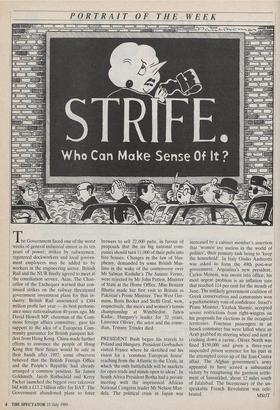PORTRAIT OF THE WEEK
The Government faced one of the worst weeks of general industrial unrest in its ten years of power; strikes by railwaymen, registered dockworkers and local govern- ment employees may be added to by workers in the engineering sector. British Rail and the NUR finally agreed to meet at the conciliation service, Acas. The Chan- cellor of the Exchequer warned that con- tinued strikes on the railway threatened government investment plans for that in- dustry; British Rail announced a £304 million profit last year — its best perform- ance since nationalisation 40 years ago. Mr David Howell MP, chairman of the Com- mons foreign affairs committee, gave his support to the idea of a European Com- munity guarantee for British passport hol- ders from Hong Kong. China made further efforts to convince the people of Hong Kong that their future would be safe in their hands after 1997; some observers believed that the British Foreign Office and the People's Republic had already arranged a common position. Sir James Goldsmith, Jacob Rothschild and Kerry Packer launched the biggest ever takeover bid with a £13.2 billion offer for BAT. The Government abandoned plans to force brewers to sell 22,000 pubs, in favour of proposals that the six big national com- panies should turn 11,000 of their pubs into free houses. Changes in the law of blas- phemy, demanded by some British Mus- lims in the wake of the controversy over Mr Salman Rushdie's The Satanic Verses, were rejected by Mr John Patten, Minister of State at the Home Office. Miss Benazir Bhutto made her first visit to Britain as Pakistan's Prime Minister. Two West Ger- mans, Boris Becker and Steffi Graf, won, respectively, the men's and women's tennis championship at Wimbledon. Janos Kadar, Hungary's leader for 32 years, Laurence Olivier, the actor and the come- dian, Tommy Trinder died.
PRESIDENT Bush began his travels to Poland and Hungary. President Gorbachev visited France where he sketched out his vision for a 'common European house' reaching from the Atlantic to the Urals, in which 'the only battlefields will be markets for open trade and minds open to ideas'. In South Africa President Botha had a private meeting with the imprisoned African National Congress leader Mr Nelson Man- dela. The political crisis in Japan was increased by a cabinet member's assertion that 'women are useless in the world of politics', their primary task being to 'keep the household'. In Italy Giulio Andreotti was asked to form the 49th post-war government. Argentina's new president, Carlos Menem, was sworn into office; his most urgent problem is an inflation rate that reached 114 per cent for the month of June. The unlikely government coalition of Greek conservatives and communists won a parliamentary vote of confidence. Israel's Prime Minister, Yitzhak Shamir, accepted severe restrictions from right-wingers on his proposals for elections in the occupied territories. Fourteen passengers in an Israeli commuter bus were killed when an Arab grabbed its steering wheel and sent it crashing down a ravine. Oliver North was fined $150,000 and given a three-year suspended prison sentence for his part in the attempted cover-up of the Iran-Contra affair. The Afghan government's army appeared to have scored a substantial victory by recapturing the garrison settle- ment of Samarkhel, about 12 miles south of Jalalabad. The bicentenary of the un- speakable French Revolution was cele-


















































 Previous page
Previous page